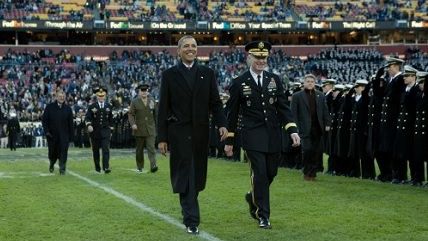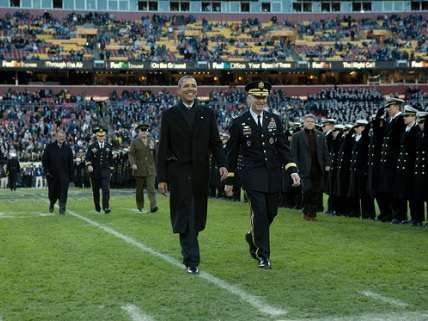War Is Peace: Obama's Foreign Policy Legacy
Slouching toward somewhere


With just about two and a half years left of President Obama's second term, it's legacy-building time at the White House. Last week the president gave two foreign policy speeches, in Afghanistan on Memorial Day to announce that the U.S. war in that country was ending by the end of the year, and at the U.S. Military Academy at West Point where he announced 10,000 troops would be left behind in Afghanistan. The president told graduating cadets they could be the first class since 9/11 not to serve in Afghanistan or Iraq.
Could.
With the seemingly open-ended military commitment President Obama is making by leaving such a large residual force in Afghanistan, it may be just as likely that this class, like every class since 9/11, will serve in Afghanistan, or even Iraq.
Congressional Authorization for the Use of Military Force (AUMF) in Iraq is still in effect. Sen. Rand Paul (R-Ky.) introduced a resolution to revoke that AUMF in January of this year, but it has still not been acted on by the Democrat-controlled Senate. And in the beginning of his first term, President Obama actually resisted the George W. Bush-negotiated end to the war, insisting on a residual force of about 10,000 troops. The U.S. has been providing support to the Iraqi government in its campaign against Al-Qaeda, a campaign that began during the U.S. war in Iraq and has continued after the end of that war.
In Afghanistan, the president appears to have gotten his way on a residual force of the same size. Meanwhile the AUMF passed after 9/11, the one targeting Al-Qaeda and affiliated forces, remains in effect. It has not been changed despite the Obama Administration paying lip service to reform. The Obama Administration's interpretation of the AUMF applies it to U.S. counterterrorism operations across Africa and Asia—conceivably the Iraq war would not need its own separate AUMF based on the president's interpretation of the post-9/11 authorization.
President Obama, then, has essentially continued a post-9/11 foreign policy doctrine first promulgated by President Bush: A state of total war, out-of-sight abroad (drone strikes, special operations, etc.) and normalized at home (domestic checkpoints, widespread and systemic surveillance and data collection, etc.) Bush's vice president, Dick Cheney, once predicted the war on terror would last our lifetimes. The "war on terror" moniker may have fallen out of favor but his prediction remains very likely.
In 2008 Barack Obama campaigned for president as the candidate who would curb America's aggressive foreign policy, promising more measured and well-thought-out foreign policy approaches. In 2012 he campaigned on having ended the war in Iraq (despite trying to extend the war), on working to end the war in Afghanistan (despite ordering a seemingly politically motivated surge in 2009), and on dismantling Al Qaeda (despite increased activity by Al Qaeda-affiliated and other Islamist terrorist groups, especially in regions that have experienced U.S.-backed interventions). By 2012 the only measure by which Obama's policies could be seen as moderate was by comparison to his Republican challenger.
The Obama Administration paints its meddling in places like Syria and Ukraine as successful because it has not pursued the kind of aggressive intervention advocated by the likes of neoconservative Republicans like John McCain, who Obama defeated in the 2008 election. The claim that avoiding the more disastrous interventions supported by politicians roundly rejected by the national electorate amounts to a success is a disheartening one.
When a State Department spokesperson tried to claim the president wasn't taking enough credit for his foreign policy successes, she was laughed at; her only concrete (a word used loosely) examples were Ukraine, and the fact that the U.S. "engaged more or as much as any other country in the world in supporting the elections process and supporting the government," as well as ongoing negotiations with Iran. These negotiations, in fact, may become the only clear foreign policy success the Obama Administration has, but until they've concluded it's hard to claim they represent an already-achieved success.
Pressed by the press corps on what exactly the president should be taking credit for that he hasn't, the State Department spokesperson referred to "efforts to dive in and engage around the world." But these are largely disasters for which the president and his administration have refused to take responsibility. Take Benghazi, where the Obama Administration misleadingly blamed a YouTube video for a coordinated terrorist attack on the U.S. mission in the city and then spent the next year and a half claiming how accurate the exact narrative over Benghazi initially was didn't matter anymore. In Hillary Clinton's new book, the former Secretary of State blames Republicans for politicizing the attack and obsessing over it. Yet both sides of the establishment miss the point; that regardless of the exact identity of the perpetrators, the deteriorated security environment in which the Benghazi attacks occurred was made possible by the U.S.-backed intervention in Libya in 2011, just as U.S. interventions of all intensities have helped Al Qaeda set up base many places the U.S. has meddled.
Ultimately, President Obama's legacy may be cemented by his successor. The next president could expand on the framework of worldwide, open-ended counterterrorism efforts constructed by the Obama Administration over the precedent set by the Bush Administration, securing Obama's legacy as the midwife that made the Bush terror doctrine palatable and permanent.
Or Obama's successor could do the work of dismantling the post-9/11 Bush-Obama approach to foreign and war policy, limiting the folly of America's post-9/11 interventionism to two presidents and one generation. Either way, however, Obama's foreign policy legacy looks to be inexorably tied to its origins in the post-9/11 policy response decided upon by the Bush Administration.
